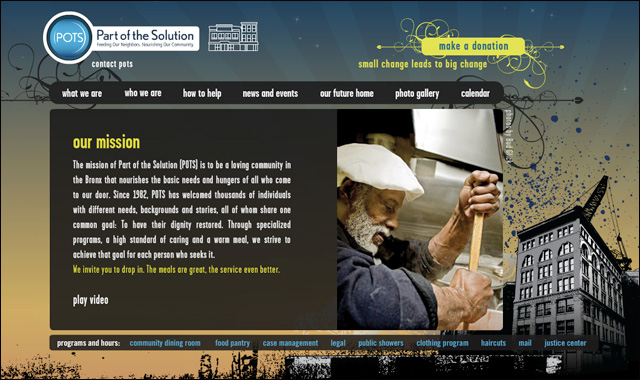Bronx Journal Staff Writer
Two-income parents, like Marta Guadalupe and her husband, are among thousands who rely on some type of assistance and yet still cannot afford to clothe or feed their children. In this Bronx community, nearly 40 percent of residents are undernourished, according to a 2010 Gallup survey. This is the highest hunger rate in the nation, according to the survey.
“Even food stamps, Section 8 and with my husband’s income it is not enough,” said Guadalupe, a middle-aged woman of Puerto Rican heritage. Guadalupe, of the Bedford Park section of the Bronx, goes every month to a pantry assistance program at POTS (part of the Solution).
Guadalupe used to walk by POTS and assumed it was only for men. Eventually, she learned that there’s no gender or age preference to qualify for the program. Despite their household income and food stamps, Guadalupe’s family still needs assistance. “Rent is $565 a month, I have Section 8, cable, cellular, light, clothes, and personal expenses,” Guadalupe said. She is also being treated for cancer, which results in high medical costs, even though she does have health insurance.
Guadalupe reflects on the findings of a report released earlier this year by Washington based non-profit Food Research and Action Center. The report showed that people in the Bronx have limited access to food.
POTS is a 28-year-old, Bronx based non-profit organization which provides numerous services to struggling families such as Marta Guadalupe.
“Pantry servings can vary on average 30 to 60 families per day… but it depends on the time of season and money,” said Tarika Rivera, a POTS case manager. “These numbers are increasing.”
At POTS, employees distribute canned goods and also offer counseling sessions about the services they provide. Besides distributing food, they also provide information about affordable housing and medical services.
Families only qualify for once-a-month pantry service. POTS distributes nine meals per each household. Depending on the month, various types of foods are distributed that includes canned goods, dairy products, cereal and fruits.
Another POTS participant who declined to give her name, says she has applied for food stamps, but is still waiting to receive them. She goes to POTS in the mean time. “I have no food stamps, so life without POTS would be hard,” said the POTS participant. She states that she is in the United States legally, but has yet to receive support from the government. With three children and a weekly income of $280 a week, it has been very difficult for her. “Kids are asking for things I can not give,” she said.
One major factor people like her and Guadalupe face is that many stores are overpriced and residents cannot afford to purchase healthy foods. As a result, obesity is a major problem in the borough. POTS employees see a disproportionate number of older African American males and Latino families visiting their site. Sister Mary Alice Hannan, POTS executive director, said families need help because they are only making a minimum wage and living in an industrial area with higher prices in supermarkets. Others are unemployed.
Hannan said 40 percent of the people who visit POTS are women and children. Philip Schmidt, a spokesman for Congressman Jose Serrano who represents the district, stated Serrano has asked for a funding increase for food assistance. “In the richest city in the richest nation on Earth, food insecurity is simply unacceptable,” Serrano said in a statement, “Immediate action must be taken to help those in need.”




